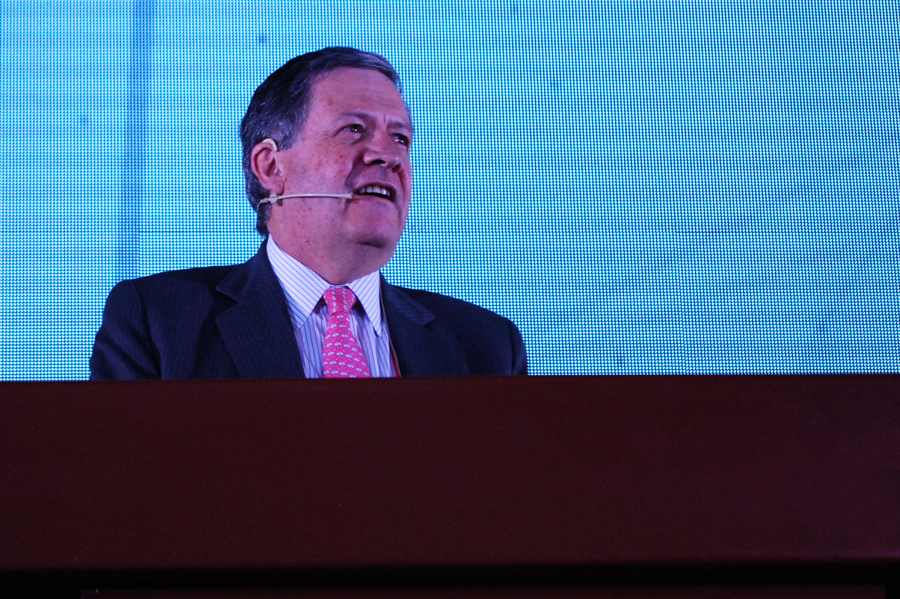data-animation-override>
“It is very painful for a society when its best students do not consider education, and do not consider being teachers. ”
Pablo Navas, President of the University of Los Andes, Colombia, spoke with the Observatory about the obstacles to innovation in Latin American universities. Also, he addressed the challenge of motivating students to choose to teach as a career and shared his vision of the future of education.
Read the full transcript:
Observatory: What are the main factors that curb innovation at universities and in the country?
Navas: I think we need to be aware that sometimes at universities we don’t practice what we preach. As I said today graphically, I have a cartoon in which the university community is asked, “Who agrees with change?” Everyone raises their hands. The second cartoon asks, “Who wants to change?” Nobody raises their hand. I think that we have internal challenges and external challenges. External challenges are often related to the issue of financing, since to innovate we need resources. Not only do we need innovation in terms of entrepreneurship, but also in terms of the internal composition of the university.
Observatory: What are the main challenges universities face in this day and age?
Navas: I believe that one of the greatest challenges for universities, both on the individual and national levels, is the financial challenge, and I say financial because I believe that we have an obligation to provide opportunities for all those people who deserve to be at the good universities. Right now, these opportunities are limited to those who can pay exorbitant tuition fees or, regardless of whether fees are high or low, there is a sector of our population that simply does not have the resources. I don’t think we have solved this issue yet. In Colombia, for example, there are excellent public universities, such as Universidad Nacional, which is wonderful. Every semester, it receives 86,000 applications, and admits 6,000 students; we need to worry about the other 80,000.
Observatory: You have invited brilliant students to serve as educators and civil servants. How would this help to develop education and the country?
Navas: I love it! In fact, I say that at all the graduation ceremonies. Universidad de Los Andes is fortunate in that it attracts the best students in Colombia, or at least it is one of the possibilities or alternatives that our best students take into consideration. We want the best students in Colombia, who have received a great education at the university – as you say – to consider public service and education as a part, or a piece, of their life project. I think that it is very painful for a society when its best students do not consider education, and do not consider being teachers. Entrusting the education of society’s children to the least able cannot be good for the future. I always insist, however, that there are amazing teachers and that all teachers are admirable, but we would like the most capable to consider education, and obviously public service, where more or less the same philosophy applies.
Observatory: Given technological advances, such as artificial intelligence and automation, how do you visualize the jobs of the future?
Navas: We all know that they are going to change. All day today, we have been listening to presentations by people who are far more knowledgeable than I am, and they have made it clear that, in a few years, the jobs that we’ll find are not the ones we have right now, and many of those that we do have today, will no longer be required by the real world. Clearly, one of the key challenges for universities is to determine the type of training we should be offering students. We understand that as well as the necessary specific knowledge of a discipline, they need to graduate with the basic competencies that will give them the capacity to modify their knowledge throughout their life. I think that artificial intelligence and automation will change the type of jobs enormously, but not the need for very good human beings who will be working for the companies.
Observatory: In your opinion, what will higher education be like in 2049?
Navas: I am not really the right person to answer that question. Frankly, I have no idea. I find it reassuring when I ask my colleagues that question and most of them give the same answer. What we do know is that it will be different, but one of the features that education will never lose is the process of interaction between young people who are finishing their training and teachers who have dedicated their lives to trying to guide and inspire them in their educational process. What will never change is that we want them to be people with the values of solidarity, who are good citizens, regardless of their activity and their work, who contribute to the community in which they live, be it the smallest in their neighborhood, or their city, or our country, or the world. I believe that whatever happens, this will always be necessary and will always be valued in a society.
This article from Observatory of the Institute for the Future of Education may be shared under the terms of the license CC BY-NC-SA 4.0 
)
)

)